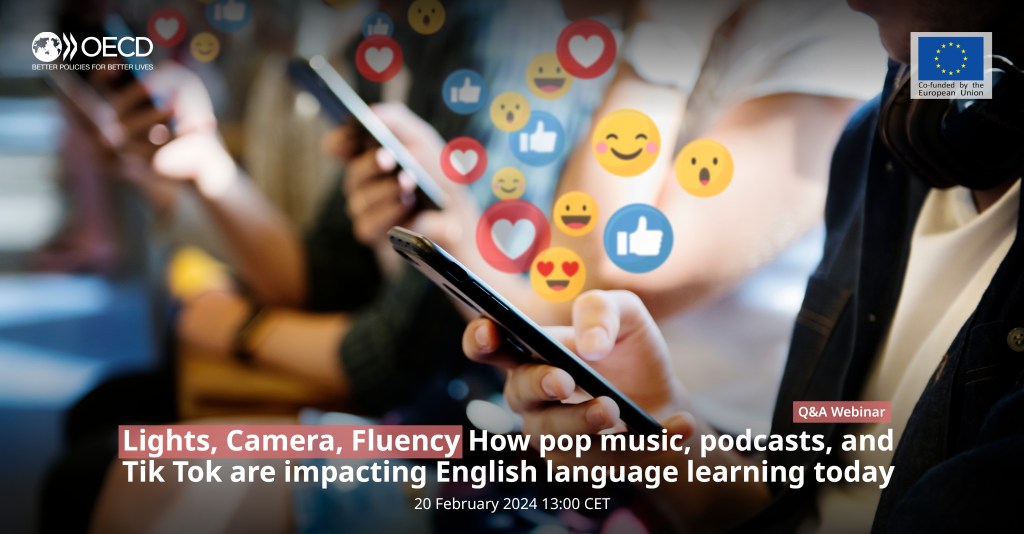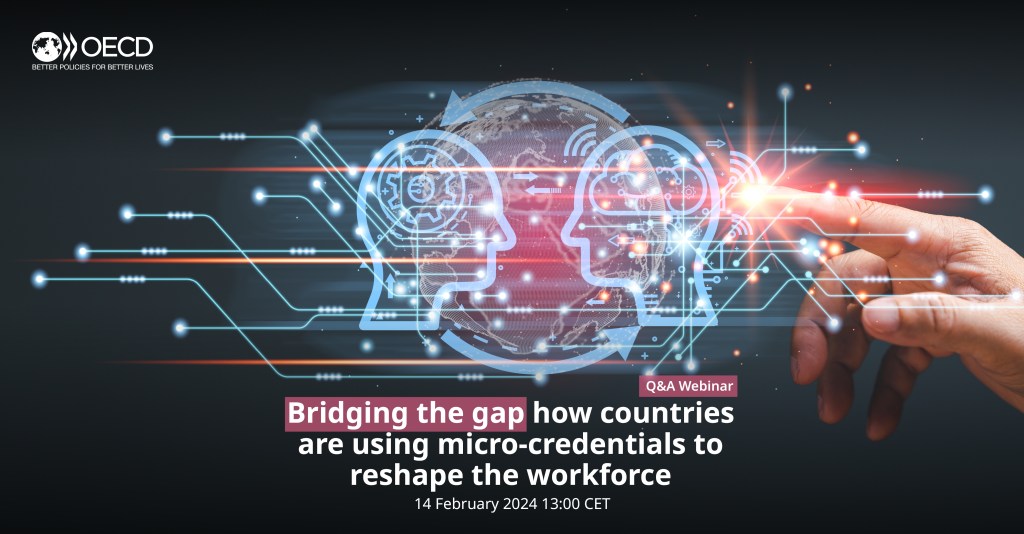Upcoming Webinars

What does child empowerment mean today? Implications for education and well-being.
15 May 14:00-15:00 CET
Child empowerment enables children to act on issues that are important and relevant to them, it develops their confidence and leadership skills, and gives students the belief to play a greater role in school life and pursue their ambitions both now and in the future. But should students be involved in school decisions about wellbeing, curriculum and spending?
The OECD’s latest publication, ‘What Does Child Empowerment Mean Today?’ dives into these and other issues.
Join OECD Secretary General Mathias Cormann and OECD Director for Education and Skills Andreas Schleicher to discover insights from the report, backed by OECD data and contributions from diverse stakeholders. Discover how children in OECD countries are actively participating in decisions that impact their lives and learn about the urgent policy concerns facing education systems in the 21st century.
Speakers include:
- Mathias Cormann, OECD Secretary-General
- Andreas Schleicher, OECD Director for Education and Skills
Register now and join the discussion!
Previous 2024 webinars

No Child Left Behind: Tackling the School Absenteeism Crisis
30 April 14:00-15:00 CET
COVID pandemic-induced school closures hindered learning for young people around the world. Yet even today, many students across the OECD have failed to return to the classroom. Two-thirds of schools in the US are facing chronic absenteeism. In England, absences are 50% higher than before the pandemic, with more than one in five secondary pupils considered “persistently absent”, missing 10% or more of their hours of schooling. Even in Norway, which in the pre-pandemic era had successfully cut absenteeism by a quarter, four out of ten school principals are now very concerned about absenteeism in their school.
School absence can have significant individual and societal consequences, spanning academic, economic social, and emotional domains. Addressing absenteeism necessitates a comprehensive approach, including identifying causes, providing support, and fostering a positive school culture that prioritises attendance and engagement.
In this webinar, we’ll talked to experts working to tackle the absenteeism crisis in communities. We looked at what we know and what knowledge gaps remain and explore effective policies and practices for a meaningful intervention to tackle the soaring number of children missing school and losing out on their education.
Speakers included:
- Michael Gary Jr., Chief of Staff, Concentric Educational Solutions, United States
- Bjørn Lescher Nuland, Divisional director for competence development, Directorate of Education, Norway
- Áine O’Keeffe, Director, Tusla Education Support Service, Ireland
- Andreas Schleicher, Director for Education and Skills, OECD
Moderated by Sasha Ramirez-Hughes, Communication Manager, Directorate for Education and Skills, OECD

The Creative Classroom: Rethinking Teacher Education for Innovation
19 April 13:00-14:00 CET
Unlock the power of creativity in education! In this OECD webinar we explored how countries are equipping educators to nurture student creativity and inspire innovative teaching methods.
In celebration of World Creativity and Innovation Day on 21 April 224, we talked about the professional learning framework for teachers and leaders developed by the OECD’s creativity and critical thinking project. Our panel showcased real-world examples of teacher learning experiences that prioritise creativity and shared insights on fostering creativity within education systems worldwide. Check out this discussion on unleashing creativity in the classroom as we reimagined teacher education to place student creativity at the forefront of learning.
Speakers included:
- Maria Wallin, Director of Institute, Berättarministeriet, Sweden
- Billie Freeland, Primary Teacher, Kent City Elementary, USA
- Jennifer Mansfield, Senior Lecturer in Science Education, School of Curriculum, Teaching and Inclusive Education, Faculty of Education, Monash University, Australia
- Cassie Hague, Analyst, Centre for Educational Research and Innovation, OECD
Moderated by Duncan Crawford, Senior Content Manager, OECD Directorate for Education and Skills.

AI and cheating in education: How can we safeguard the integrity of exams?
17 April 11:30-12:30 CET
Cheating in high school exams is an age-old problem, but new technologies have made it easier than ever resulting in huge issues for fairness and credibility. In today’s digitally connected and AI inclusive world, ensuring the integrity of exams is a major challenge. From plagiarism detection software to solutions leveraging facial recognition and eye-tracking technology, various measures are being deployed to combat cheating. But do they work? And do educators need reevaluate how to hold fair exams in a world of previously unimagined unlimited digital resources?
In this webinar, we explored questions surrounding AI and cheating by looking at the shifting dynamics of high-stakes examinations. We discussed OECD research on digitising high-stakes examinations in upper secondary education, examined strategies to make them more secure and debated how they might look in the future.
Speakers included:
- Dr. Phillip Dawson, Professor, Deakin University
- Dr. Christina Wikstrom, Associate Professor, Umeå University
- Shivi Chandra, Policy Analyst, Above & Beyond: Transitions in Upper Secondary Education project, OECD
Moderated by Duncan Crawford, Senior Content Manager, OECD Directorate for Education and Skills.

Advancing Gender Equality: The Crucial Role of Science and Technology
4 April 13:00-14:00 CET
In recent decades, there has been a notable increase in the development of education policies that prioritise gender equality, spanning both during and post-education periods. The question of their effectiveness is subject to ongoing debate. Results from the 2022 Programme for International Student Assessment (PISA) confirm the persistence of gender disparities. For example, girls still outperform boys in reading and boys still have the advantage in mathematics. These examples require deeper inspection.
In this webinar, we explored the nuanced relationship between gender disparities in education and employment and how science and technology are related to a wide variety of jobs in Creative Industries, Financial and Digital Industries as well as in Green jobs.
Speakers include:
- João Costa, Minister of Education, Portugal
- Laura Ripiani, Labor Markets and Social Security Division Chief, IADB
- Diana Zamora, Global Public Policy Director, Mastercard
- Eric Charbonnier, Analyst, Innovation and Measuring Progress Division, OECD
Moderated by Marta Encinas-Martin, OECD Education Gender Ambassador

Launch of the PISA-VET Framework: A Global Milestone in Future-Ready Professional Skills
19 March 11:00-12:00 CET
Vocational Education and Training (VET) plays a crucial role in ensuring that both young people and adults possess the skills required by societies and labour markets. As the global landscape of VET undergoes transformative shifts, so too does the need for a collaborate approach in professional skills measurement. The PISA-VET Framework, a joint effort between 13 countries as well as more than one hundred experts, employers, and international partners, will take centre stage as a beacon of innovation, designed not just to assess, but to guide, inform, and inspire.
Watch the recording as Yoshiki Takeuchi, Deputy Secretary General at the OECD, launched the framework. Following opening remarks, we talked with leading experts to delve into the core of this innovative approach, providing a comprehensive understanding of how together we can redefine the landscape of vocational skills and education.
Speakers include:
- Yoshiki Takeuchi, Deputy Secretary General, OECD
- El Iza Mohamedou, Head of OECD Centre for Skills
- David Hoey, CEO, WorldSkills International
- Hanni Rosenbaum, Executive Director of Business at OECD
- Markus Schwertel, Director for HP Global Policy & Strategy team
- Olga Mironenko Stampfer, Vice President, International Relations at United Health Group
Moderated by Duncan Crawford, Senior Content Manager, OECD Directorate for Education and Skills.

Diversity + Quality = Equity? A complex equation for early childhood education and care
4 March 14:30-15:45 CET
Check out the recording of our Q&A webinar by clicking below and explore the intersection of diversity and quality in Early Childhood Education and Care (ECEC) through OECD’s latest research. Discover correlations between dimensions of diversity and ECEC quality, delve into what aspects of quality matter most for diverse backgrounds, and identify policy priorities for enhanced provision.
The discussion was based on the latest OECD Education Working Papers and reports shedding light on the relationship between diversity and quality.
Speakers included:
- Andreas Schleicher, Director for Education and Skills, OECD
- Michel Vandenbroeck, Ghent University, Belgium
- Alejandra Cortázar, Centro de Estudios Primera Infancia – CEPI, Chile
Moderated by Mihaela Ionescu, ISSA, The Netherlands

The art of balancing curricular choice in upper secondary education
29 February 13:00-14:00 CET
Upper secondary education helps refine the interests and expertise of students, preparing them for future study or careers. Yet in a system that fails to offer sufficient student choice in subject matter, learners may disengage, not reach their potential, or even drop out of school.
In our latest webinar focusing on upper secondary education, we delved into how countries design their curricula, balancing core subjects like literacy and numeracy with the freedom to explore other subjects of interest such as science, literature or economics.
Check out the recording to see us drawing insights from the OECD’s comparative research and hear from policy makers on their country’s experiences as well as lessons learned.
Speakers included:
- Ihor Khvorostianyi, General Director of the School Education Directorate, Ministry of Education and Science, Ukraine
- Fritjof Karlsson, Senior Advisor in a national commission of inquiry, Sweden
- Adeline Croyère, Directrice des lycées et de la formation professionnelle au Ministère de l’éducation nationale et de la jeunesse, France
- Stella Pearson, Deputy Director, Advanced British Standard, UK (England)
- Camilla Stronati, Junior Policy Analyst, Transitions in Upper Secondary Education project, Directorate for Education and Skills, OECD
Moderated by Sasha Ramirez-Hughes, Communication Manager, Directorate for Education and Skills, OECD

Lights, Camera, Fluency: How pop music, podcasts, and Tik Tok are impacting English language learning
20 February 13:00-14:00 CET
Step into the future of English language education. Beyond timetabled lesson hours, today’s students are immersing themselves in English from an increasingly early age through diverse and exciting new avenues, reshaping the landscape of language acquisition. But with many countries and families investing considerable amounts to ensure students leave school with sufficient language skills, what are the implications of this new English-learning reality for teachers and students?
Our panel, inspired by key findings from the OECD’s research on global English learning which is co-financed by the European Commission, shared insights and discussed implications for today’s education systems.
Speakers included:
- Andreas Schleicher, Director for Education and Skills OECD
- Sophia Eriksson, Director for Youth, Education and Erasmus+, European Commission
- Anna Sole Mena, Senior Expert, European Commission
- Selma Koyuncu, Teacher of English, Puistopolun Comprehensive School, Helsinki, Finland
- Hanan Khalifa, Language testing and evaluation expert
- Stavros Kontos, English language student, 2nd Model General Lyceum of Athens, Greece
Moderated by Sasha Ramirez-Hughes, Communications Manager, Directorate for Education and Skills

Bridging the gap – How countries are using micro-credentials to reshape the workforce
14 February 13:00-14:00 CET
In an era where traditional education and training pathways are being reimagined, micro-credentials – smaller, more targeted, and more flexible education programs – emerge as a solution to the increasing demands for upskilling and reskilling. Recognised as pivotal in facilitating swift skill acquisition, these programmes are gaining momentum globally. But how are countries integrating micro-credentials into their education systems?
This Q&A webinar looked at the findings of the OECD-European Commission ‘Micro-credential Implementation Project’ which explores how OECD countries, particularly Finland, the Slovak Republic, Slovenia, and Spain, are responding to the rise of micro-credentials and how integrating them is re-shaping the landscape of lifelong learning and workforce development.
Speakers included:
- Petri Haltia, Senior Ministerial Adviser, Ministry of Education and Culture, Finland
- Peter Ondreička, Director of Higher Education Department, Ministry of Education, Science, Research and Sport, the Slovak Republic
- Duša Marjetič, Head of Higher Education Division, Ministry of Higher Education, Science and Innovation, Slovenia
- Pedro Martínez Martín, Senior Ministerial Adviser, Ministry of Science, Innovation and Universities, Spain
- Isabel Ladron Arroyo, Policy Officer, Directorate-General for Employment, Social Affairs and Inclusion, European Commission
- Shizuka Kato, Higher Education Policy Analyst, Directorate for Education and Skills, OECD
Moderated by Simon Roy, Head of Higher Education Policy, Directorate for Education and Skills.

Making learning resilient in a changing climate
8 February 12:00-13:00 CET
Climate change is here. Besides continuing to work to reverse emissions growth, we must adapt to its impacts, including on education. This means that not only must learners acquire new skills, but the very structure of education spaces must be reimagined to ensure uninterrupted learning in the face of extreme weather, flooding, and wildfires. Action plans are needed for education during climate emergencies and to ensure equitable access, addressing disparities from varying climate exposures and access to technology.
Drawing on insights from the OECD Skills Outlook 2023, this webinar fostered a dialogue about the infrastructural, curricular, and organisational measures that can empower education and training systems to adapt effectively to the challenges posed by climate change.
Speakers included:
- Mustafa Yesil, National Education Expert, Ministry of National Education, Türkiye
- Francesca Bastagli, Head of Research and Policy, Fondazione Agnelli
- Johannes Klumpers, Senior Expert DG CLIMA, Adaptation and Resilience to Climate Change, European Commission
- Andreas Schleicher, OECD Director for Education and Skills.
It was moderated by Sasha Ramirez-Hughes, Communications Manager, Directorate for Education and Skills.

Decoding the hype: can AI help create accessible and inclusive student learning?
6 February 13:00-14:00 CET
Artificial intelligence (AI) is touted as having the potential to revolutionise the way students learn and teachers teach. Among the benefits, AI can help prepare students for the challenges of the digital age, develop 21st Century skills and provide personalised feedback. However, there are many challenges including the need for technical expertise and ethical concerns. Should we believe the hype?
In this OECD webinar, educators, policy makers and technology developers explored the potential of AI in creating accessible and inclusive learning environments. They discussed personalised learning, examined how AI can support tailored educational experiences that respect diversity in classrooms, and talked about the future impacts of AI in equity and inclusion in education, which forms part of the latest work from the OECD on Digital equity and inclusion in education.
Speakers included:
- Wayne Holmes, Associate Professor at the University College London (UCL)
- Nikol Rummel, Research Professor at the Center for Advanced Internet Studies
- Emile Kroeger, Senior software engineer, United Robotics Group
- Kevin Johnstun, Program Specialist at the US Department of Education
It was moderated by Duncan Crawford, Senior Content Manager, OECD Directorate for Education and Skills.

Research evidence in education serves as a compass, guiding decisions on educational progress, equity and resource optimisation. Overcoming the challenges of harnessing research evidence in education for policy makers and practitioners involves fostering a culture of research engagement, as the OECD’s Strengthening the Impact of Education Research project explores.
In this Q&A webinar we talked about crucial system-level elements, including resources, incentives, structures and processes, and the need for systems approaches to knowledge mobilisation. We discovered real-world examples and insights from our experienced guests, on strategic implementation of systemic enablers, navigating challenges and the influential role played by leaders. We also discussed how communication was like ‘the tango’ and talked about the latest Spotlight Systemic Enablers for a Culture of Research Engagement in Education from the OECD Strengthening the Impact of Education Research project.
Speakers included:
- Matthew Soldner, Commissioner, National Center for Education Evaluation and Chief Evaluation Officer at the U.S. Department of Education
- Makito Yurita, Professor, National Institute for School Teachers and Staff Development, Japan
- Elaine Munthe, Director, Knowledge Centre for Education, Norway
- Vicky Colbert, Executive Director, Fundación Escuela Nueva Volvamos a la Gente, Colombia
- Jordan Hill, Analyst, OECD Centre for Educational Research and Innovation
It was moderated by Tal Malkin, Strengthening the Impact of Education Research project, OECD.
Engaging with education research – With a little help from the system

Social and Emotional Learning – does it make a difference in children’s lives?
Can social and emotional skills be taught? If so, how does this make a difference in the lives of children? What assessment tools can inform education systems about the effectiveness of social and emotional learning to ensure it is making a positive difference in children’s lives?
In this OECD webinar, we looked at the most recent evidence showing social and emotional skills can be effectively taught through educational interventions and the positive impacts they have on various life outcomes, such as academic achievement and mental health. We also discussed the need for assessment in this field – reliable measurement tools which show the effectiveness of social and emotional learning programs targeting young people. Finally we spoke about the OECD Working Paper, ‘Social and emotional skills: Latest evidence on teachability and impact on life outcomes.
Speakers included:
- Bo Stjerne Thomsen (Head of Educational Impact, LEGO Education)
- Jennifer Adams (Karanga – Global Alliance for Social Emotional Learning and Life Skills)
- Adriano Linzarini (Lead Analyst, Rethinking Assessment of Social and Emotional Skills project, OECD)
- Poonam Borah (UNESCO Mahatma Gandhi Institute of Education for Peace and Sustainable Development)
It was moderated by Daniel Catarino da Silva, OECD.

